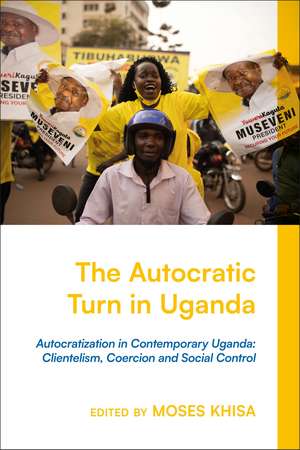Autocratization in Contemporary Uganda: Clientelism, Coercion and Social Control
Editat de Moses Khisaen Limba Engleză Hardback – 7 feb 2024
Preț: 541.71 lei
Preț vechi: 774.78 lei
-30% Nou
Puncte Express: 813
Preț estimativ în valută:
103.70€ • 106.71$ • 87.42£
103.70€ • 106.71$ • 87.42£
Carte tipărită la comandă
Livrare economică 28 februarie-14 martie
Preluare comenzi: 021 569.72.76
Specificații
ISBN-13: 9781350323537
ISBN-10: 1350323535
Pagini: 320
Dimensiuni: 156 x 234 mm
Greutate: 0.62 kg
Editura: Bloomsbury Publishing
Colecția Zed Books
Locul publicării:London, United Kingdom
ISBN-10: 1350323535
Pagini: 320
Dimensiuni: 156 x 234 mm
Greutate: 0.62 kg
Editura: Bloomsbury Publishing
Colecția Zed Books
Locul publicării:London, United Kingdom
Caracteristici
This book's theoretical framing and the range of subthemes constitute a comprehensive reassessment of Museveni's rule, going beyond existing work that has been restricted to specific themes
Notă biografică
Moses Khisa is Associate Professor of Political Science and Africana Studies, North Carolina State University, USA.
Cuprins
PREFACEACKNOWLEDGEMENTSINTRODUCTION: Theory and Trajectory of Autocratization in Contemporary UgandaMoses Khisa, North Carolina State University, USAPart I: CLIENTELISM AND RESOURCESChapter 1: Political Clientelism and Museveni's AuthoritarianismNelson Kasfir, Dartmouth College, USAChapter 2: "The one and only Revolutionary President": Heritage, Memory and the Personalisation of NRM RuleJonathan Fisher, University of Birmingham, UK, and Stephanie Cawood, University of the Free State, South AfricaChapter 3: Museveni and Government-Foreign Business Relations in the Electricity SectorRoger Tangri and Andrew M. MwendaPart II: CO-OPTATION, COERCION & SOCIAL CONTROLChapter 4: State Co-optation of Feminism: Unpacking the Paradoxes of Political RepresentationTabitha Mulyampiti, Makerere University, UgandaChapter 5: Obstructing Civil Society: State Backlash, Co-optation and Coping MechanismsMesharch W. Katusiimeh, Kabale University, UgandaChapter 6: Uncertainty, Militarism and the Politics of Regime SurvivalSabastian Rwengabo, Centre for Basic Research, UgandaChapter 7: The Military as an Instrument of Regime SurvivalGerald Bareebe, York University, CanadaChapter 8: Institutionalized Arbitrariness as Autocratic AdaptabilityRebecca Tapscott, University of York, UK Part III: INSTITUTIONS AND COALITION POLITICSChapter 9: Between Change and Continuity in the Ruling CoalitionMoses Khisa, North Carolina State University, USAChapter 10: Autocratization by ElectionsAnders Sjögren, Uppsala University, SwedenChapter 11: From Movement to Multiparty: The State and the Role of Political PartiesFrederick Golooba-Mutebi, Uganda Martyrs University, Uganda, and Mesharch W. Katusiimeh, Kabale University, UgandaCONCLUSION: Uganda at Political Crossroads?Moses Khisa, North Carolina State University, USA, and Sabastiano Rwengabo, Centre for Basic Research, UgandaIndex
Recenzii
This compilation of insightful essays charts the autocratization of Uganda since President Yower Museveni's takeover in 1986, effectively demonstrating how the regime has become increasingly personalized and institutionally fragmented. The book shows how the longevity of the regime is a result of cooptation and coercion. Each chapter examines a different set of institutions to uncover mechanisms of institutional adaptability, pervasive clientelism, and legal manipulation. Taken as a whole, the book provides a significant contribution to our understanding of how autocracy operates today in Africa.
In theorizing Uganda's politics, this book propels the prevailing research agenda beyond current parameters, while its empirical underpinnings provide a scholarly tone for practical future inquiry.
There has been a welcome recent spate of books on the Yoweri Museveni/NRM regime in Uganda, but the breadth and depth of this anthology is quite significant and refreshing; it is also quite timely.
Autocratization in Contemporary Uganda: Clientelism, Coercion and Social Control offers a comprehensive, nuanced and insightful analysis of the complex factors behind regime resilience and autocratic deepening in Uganda and its implications. The group of authors´ collective grasp of autocratic theory and historic and contemporary debates in Ugandan politics has produced a "must read" volume for scholars and students interested in autocratization and the political and economic factors underpinning Uganda's political trajectory under President Museveni.
The current National Resistance Movement government in Uganda rests on a puzzling combination of the stability and resilience of President Museveni's rule on the one hand, and an increasingly personalized and vulnerable system on the other. In this volume, a collective of Uganda-experts offers important and insightful perspectives on this puzzle. A must read to help us understand not only the Ugandan path but processes of autocratization on the African continent and elsewhere.
In theorizing Uganda's politics, this book propels the prevailing research agenda beyond current parameters, while its empirical underpinnings provide a scholarly tone for practical future inquiry.
There has been a welcome recent spate of books on the Yoweri Museveni/NRM regime in Uganda, but the breadth and depth of this anthology is quite significant and refreshing; it is also quite timely.
Autocratization in Contemporary Uganda: Clientelism, Coercion and Social Control offers a comprehensive, nuanced and insightful analysis of the complex factors behind regime resilience and autocratic deepening in Uganda and its implications. The group of authors´ collective grasp of autocratic theory and historic and contemporary debates in Ugandan politics has produced a "must read" volume for scholars and students interested in autocratization and the political and economic factors underpinning Uganda's political trajectory under President Museveni.
The current National Resistance Movement government in Uganda rests on a puzzling combination of the stability and resilience of President Museveni's rule on the one hand, and an increasingly personalized and vulnerable system on the other. In this volume, a collective of Uganda-experts offers important and insightful perspectives on this puzzle. A must read to help us understand not only the Ugandan path but processes of autocratization on the African continent and elsewhere.
